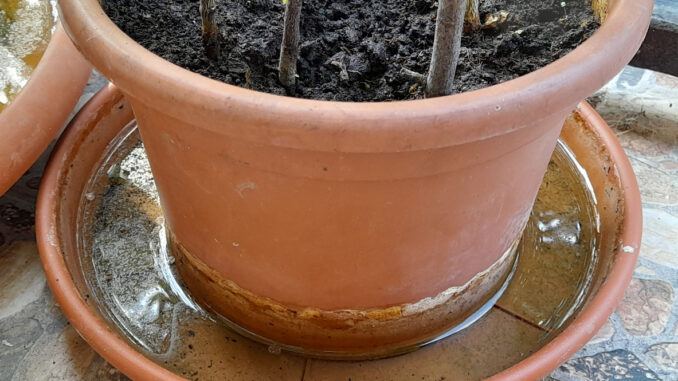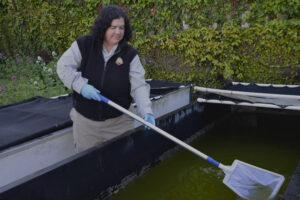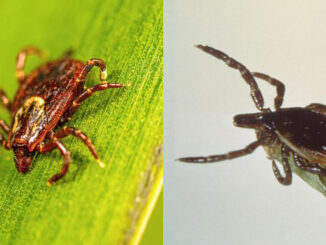
Santa Barbara County residents can take these simple steps to protect themselves, their pets, and their neighborhood from mosquitoes
by Elizabeth Ann Morabito
Did you know that you can single-handedly stop thousands of mosquitoes from ever hatching? Yes, you wield that much power. A small amount of standing water – even as little as a bottle cap full – can be the perfect breeding ground for some mosquito species. All you need to do is dump the water. See? That’s not so hard!

mosquito larvae in bodies of stagnant water
Photo credit Nell Campbell
The community is our eyes and ears. We can’t be everywhere at once—so if you notice something, say something. That’s how we stop outbreaks before they start.
Vesna Smith*, lead vector control technician at MVMD
Here are some more simple yet effective steps to keep your yard and neighborhood mosquito free:
1. Eliminate Standing Water
Water is the key to mosquito breeding—no water, no mosquitoes. Dumping it out is one of the most powerful tools in mosquito control.
“After the rain, it gives folks at least two to three weeks for them to get proactive and dump out all that water that’s standing,” explains Vesna Smith, lead vector control technician of the Mosquito & Vector Management District of Santa Barbara County.
“Probably 90% of the time they have something on their property that’s breeding,” she adds, explaining how residents frequently overlook issues in their own yards.
- Dump and scrub containers like flower pots, birdbaths, plant saucers, and toys.
- Improve drainage and fix leaky hoses and faucets to avoid standing water buildup.
- Clean out yard drains that trap water just below the surface.
- Check and clear rain gutters regularly—silt and leaves trap moisture.
2. Keep Mosquitoes Out of The House
- Install and maintain screens on windows and doors.
- Use air conditioning when possible instead of leaving windows open.
- Turn off outdoor lights at night to avoid attracting mosquitoes.
- Use fans indoors and near entry points—mosquitoes can’t fly well in strong airflow.
3. Protect Yourself
- Use EPA-approved repellents with DEET, picaridin, or oil of lemon eucalyptus.
- Wear long sleeves and pants, especially during dawn and dusk.
- Limit outdoor activities during peak biting hours.
4. Protect Your Pets
- Ask your vet about heartworm prevention and mosquito-safe products.
- Change water bowls regularly to avoid larvae buildup.
- Keep horses stabled at dusk and dawn, and vaccinated against West Nile Virus.
- Use mosquito dunks in water troughs—they’re safe for pets and people.
5. Maintain Your Yard
- Trim overgrown grass and shrubs.
- Clear out damp debris like fallen leaves and branches.
- Request free mosquito fish from MVMD to control larvae in ponds, fountains, and unused pools.

Photo courtesy of Center for Disease Control Public Health Image Library
6. Report Activity or Concerns
Early reports help prevent major outbreaks. If you spot something unusual, speak up:
- Report large mosquito swarms, standing water, or neglected pools.
- Report dead birds—they’re early indicators of West Nile Virus.
- Report daytime ankle biters—they could be Aedes aegypti, an invasive species that spreads dengue, Zika, and Chikungunya viruses.
“The first report of the invasive Aedes was from someone who worked in Ventura County,” Smith recalls. “It was on the news in Ventura with pictures and a description, and that guy thought, ‘Oh hey, I think I have some of those in my house.’ And he did.”
- Encourage your neighbors to stay alert and report what they see.
“The community is our eyes and ears,” Smith emphasizes. “We can’t be everywhere at once—so if you notice something, say something. That’s how we stop outbreaks before they start.”
When asked which mosquitoes to report, she’s clear: “All of them. We like feedback.”
“The main thing is, don’t hesitate to call,” she continues. “If we don’t know the answer or if it’s not within our realm, then we could definitely refer people to the correct contacts.”
7. Stay Informed
- Follow MVMD on Facebook, Instagram, and Nextdoor for updates, alerts, and prevention tips.
* Name changed for privacy purposes
How you can help keep Santa Barbara County safe:
- Spot unusual mosquito activity? Especially daytime ankle biters? It could be invasive Aedes aegypti—report immediately: mvmdistrict.org/contact-us or call (805) 969-5050.
- See standing water or a neglected pool? Let MVMD know: mvmdistrict.org/contact-us or call (805) 969-5050.
- Found a dead bird? It may be linked to West Nile Virus. Report it to the California Department of Public Health: westnile.ca.gov/report.



